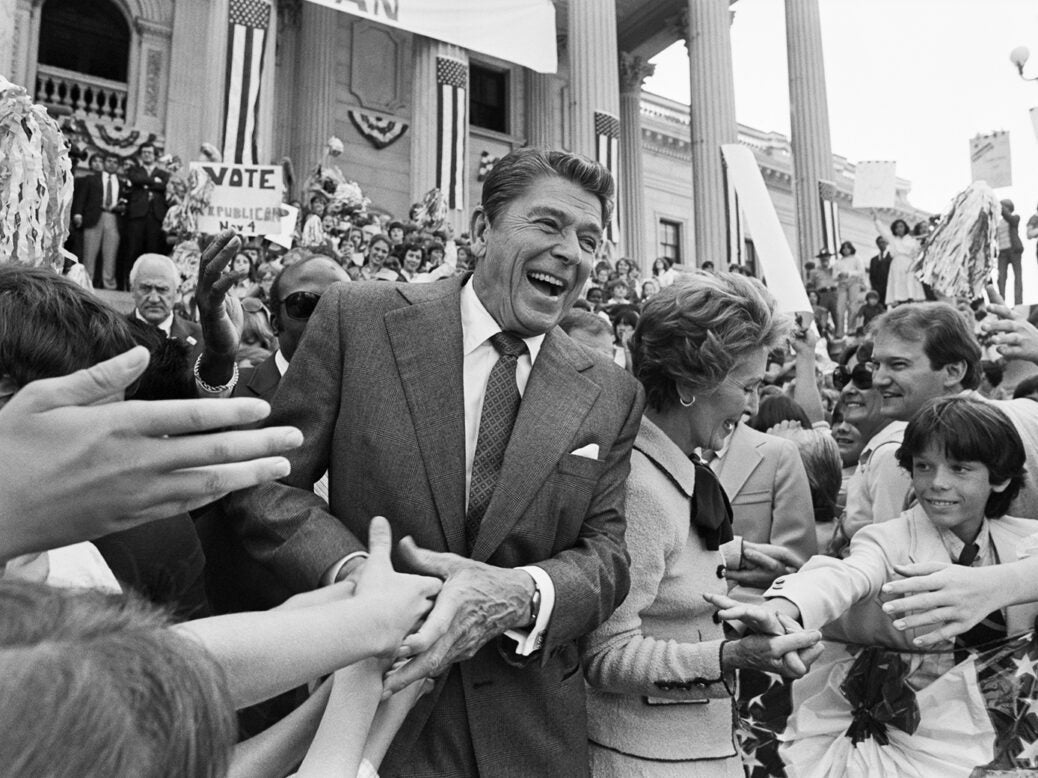
In the final week of the 1980 US presidential election campaign, then candidate Ronald Reagan posed the question to the American public: “Are you better off today than you were four years ago?” Political legend has it that American voters answered “no” and delivered a landslide victory to Reagan. “Are you better off?” has since entered campaign folklore as one of the most effective closing arguments in political history.
Fast forward to 2022, and it is worth asking what impact the same question might have if asked at the next UK General Election.
This question feels appropriate today given mounting evidence from recent polling that the Conservatives might not like the answer they get. For example, our most recent Ipsos Political Monitor, taken in March, shows economic optimism at its weakest level since the 2008 financial crash, with 76 per cent of people saying the economy will worsen in the next 12 months. In an Ipsos poll taken after the Spring Statement 69 per cent of the public said the British economy was in a bad state (up ten percentage points from November). None of this should surprise us, given the gloomy assessments of the Office for Budget Responsibility and others.
Looking deeper, it appears that public pessimism is driven by concerns about the rising cost of living in Britain. Ipsos polling in March showed that 74 per cent expected motoring and fuel costs to increase in the next six months, 85 per cent expected the cost of food shopping to increase, and 85 per cent said the same about utility bills. Furthermore, 61 per cent told us it was inflation and rising prices that most influenced how they viewed the economy, rather than other factors like unemployment or GDP.
Just as importantly, almost nine in ten people have consistently told us in successive polls that they are following stories about the rising cost of living closely in the media. This was even true the week Boris Johnson and Rishi Sunak were issued with fines for breaking Covid rules. Clearly, cost of living concerns are important to the public, even with many other stories on the agenda.
Britain feels worse off
In this context it will come as no surprise that when Ipsos asks the British public “the Reagan question” directly (“are you better off than before the Conservatives won re-election in 2019?”), the answer is a resounding “no”. Ipsos polling in early April showed that 59 per cent of Britons thought they were worse off than before the last general election, including half of 2019 Conservative voters (51 per cent). Just 15 per cent said they were better off.
Of course, any examination of this question must consider to what extent the public actually blames the current government for the rising cost of living. Here the picture is more mixed. On the one hand, 64 per cent said in March that the economic policies of the government had contributed to the rising cost of living either “a great deal” or “a fair amount”. On the other hand, factors such as the Covid-19 pandemic (78 per cent), the global economy generally (77 per cent) and the Russian invasion of Ukraine (73 per cent) were all seen to be contributing more. The public recognises that several factors are at play here.
Nevertheless, public concern about the cost of living is real and it has real-world political implications for both the Prime Minister and the Chancellor. It is notable that 83 per cent of Britons have told Ipsos that the rising cost of living is an important factor in how they judge Johnson, and more Britons now think Rishi Sunak is doing a bad job (44 per cent) rather than a good job (29 per cent).
Examining the alternative
But what of the alternative? Surely the Reagan question only matters for the Conservatives if Labour is seen as being able to do better? Here, the news is also worrying for the Tories: our early April polling showed that 43 per cent trusted Labour to reduce their cost of living compared with just one in four trusting the Conservatives (25 per cent). Meanwhile, 29 per cent thought they’d be better off if Labour won the next general election (34 per cent said worse off) whereas just 17 per cent said they would be better off if the Conservatives won (51 per cent said worse off).
While these numbers are not a slam dunk for Labour, as 51 per cent said they did not trust the party to reduce their cost of living either, the opposition’s relative position to the Conservatives may come to worry government strategists.
Should Conservatives fear the Reagan question?
Returning to the question at hand, should the Conservatives fear the Reagan question? Based on current polling, the answer seems to be yes. It should certainly be a matter of concern.
First and foremost, the answer to the “are you better off question” at the moment looks to be a clear “no” and while the public clearly doesn’t blame the Conservatives entirely for that, most think Conservative policies have contributed to some degree. Sunak’s personal poll ratings have suffered accordingly, and such considerations are key to how the Prime Minister is seen by the public too. Moreover, current polling shows Labour more trusted in dealing with the issue, with voters more inclined to say they would be better off under Labour than the Conservatives in the future. (This does, however, more reflect Conservative weakness than great enthusiasm for Keir Starmer’s party.)
It is clearly too early to know the importance of the cost of living at the next general election, or if Labour will still lead on the issue then, there is enough evidence of Conservative vulnerability to cause Tory strategists concern. The question Ronald Reagan posed all those years ago could still play a big role in UK politics today.
Keiran Pedley is director of politics at Ipsos.